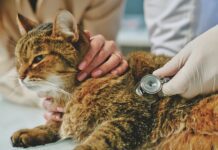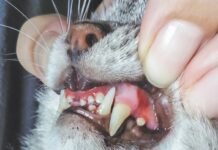It varies among cats, but we consider a cat to be senior anywhere between ages seven and 10, says Ilona Rodan, DVM, a private practitioner in Wisconsin. Our goal is to prevent problems. Even if he looks healthy at seven, we recommend preventative health care, including diagnostic testing to rule out older cat diseases. Our senior panel, which includes blood, urine, blood pressure, and eye pressure tests, is designed to detect older cat diseases such as high blood pressure and thyroid and kidney diseases.
Even subtle changes in behavior, attitude, or appetite could indicate a serious underlying problem. Every cat seven or older should see the veterinarian at a minimum of every six months. Older cats can live a very long, comfortable life, and the quality of that life is improved by vigilance of the person at home, says Rodan, who is board certified by the American Board of Veterinary Practitioners. As Tigers caregiver, you know his habits and preferences better than anyone. Be alert for these signs:
Weight loss. Usually the first sign of a health problem, weight loss can signal cancer, hyperthyroidism, pain, dental problems, liver or kidney disease, or other serious illness. Since weight loss can be difficult to detect, weigh Tiger regularly, ideally on a scale calibrated in ounces, either at the veterinary hospital or at home.
Appetite loss. If Tiger stops eating, if his appetite has tapered, if he looks as though he is interested in food but backs away or tries to bury food – call his veterinarian. Never ignore appetite loss of 24 hours or more. Cats that go without food for too long, risk developing hepatic lipidosis, a serious liver disease. Never ignore vomiting, diarrhea, or nausea – which may cause drooling, smacking lips, or just a general sick look.
Increased appetite can signal diabetes mellitus or hyperthyroidism.
Increased water consumption could signal diabetes mellitus, hyperthyroidism, or kidney disease.
Persistent cough. Do not assume hairballs. If Tiger is still coughing after getting hairball medication once, he needs to visit his veterinarian.
Lumps, bumps, or asymmetry can be signs of cancer. Abdominal swelling can signal congestive heart disease or cancer.
Behavioral changes. The two most common ones we see with older cats are litter box misses and howling, says Rodan. Anger, spite, jealousy, or just getting old do not cause misbehavior. Hiding, seeking out unusual places, drinking water from unusual places, sudden aggressiveness, especially in a usually placid cat – all can mean pain and illness. Schedule a complete checkup and diagnostic work up. If medical problems are ruled out, address behavioral issues.
Listlessness and lethargy. Older cats sleep more, but extreme or persistent lack of energy and interest in his environment may mean Tiger is suffering from an illness.
Do Tigers teeth hurt? Cats are so good at hiding pain that mouth and tooth disease are often well advanced before theyre noticed. Schedule Tiger for a thorough teeth cleaning and oral evaluation, including x-rays, under anesthesia. Is it safe? With new anesthetics and anesthetic monitoring equipment, its a far greater risk to the kitty not to have the dental examination. Bad teeth cause pain, appetite loss, and infection that can spread to other organs. Says Rodan, We anesthetize older cats for dentistry all the time. Clients regularly tell us their cats feel and eat so much better after a good dental cleaning and necessary dental work.
Increased vocalization. Tiger could be losing his hearing. Test by observing his reactions to a handclap or other noise. If you suspect hearing loss, keep Tiger safe indoors, and protect him around other cats that are more active. If Tigers hearing seems to be fine, schedule an appointment with your veterinarian to rule out other causes of increased vocalization such as hyperthyroidism.
Ratty hair, buildup of earwax, or catching claws on carpet. Arthritis, weakness, or forgetfulness can cause older cats to neglect grooming. Help Tiger maintain comfort and dignity with a comb or soft brush, mindful of his bony frame and thinner skin. Gently wipe wax or gunk from his ears with dry gauze or a cotton ball.
Never poke into his ear canals. Many older cats do not wear down their nails because they dont use them as much, so keep his nails trimmed. Depending on the health and personality of the cat, notes Rodan, it might be better to have a veterinary assistant, veterinary health professional, or groomer do the trimming.
Is it ever safe to assume any of these changes and symptoms means Tigers just getting old? No, says Rodan. I wouldnt feel comfortable dismissing anything as just old age. Without checking the cat, reviewing his history, and performing a physical exam and diagnostic work up, I wouldnt dismiss even a minor change.



